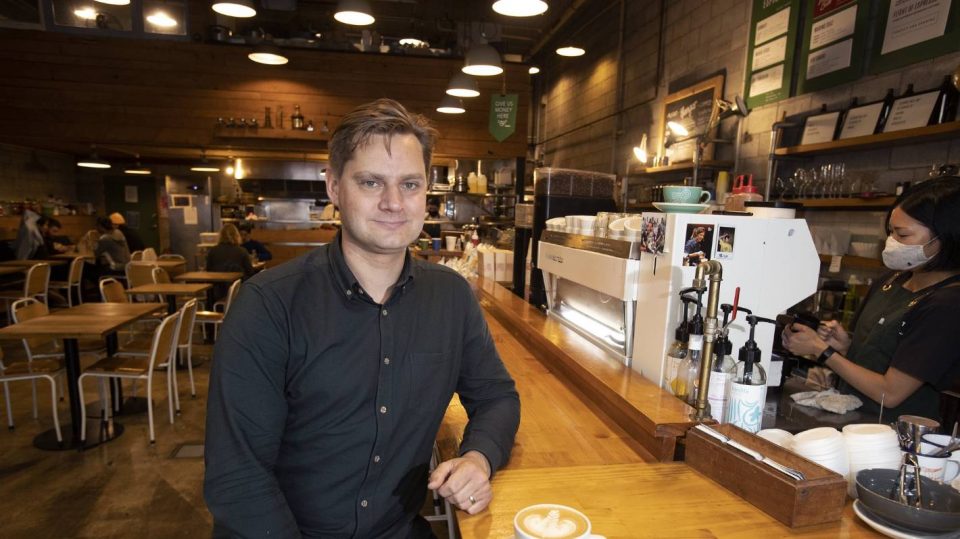New Zealanders will need to be prepared to fork out more than $7 for a large flat white if cafes are going to survive, according to a local industry expert.
Former cafe owner and coffee wholesaler Richard Corney opened his first cafe in Napier 15 years ago, charging $4 for a large flat white.
Most cafes around the country are still charging $4.50 to $5. But rising rents, wages, the price of milk, and inflation has seen the cost of running a cafe increase 10-fold.
“A lot of places, especially in Auckland and Waikato, have had no income for almost an entire quarter,” Corney explained.
READ MORE:
* Coffee trends for 2022: Oat milk, milk taps, and a pricier pour?
* Fonterra launches ‘milk tap’ trial for cafes in NZ’s coffee capital, Wellington
* Cafes take another hit as coffee machine and pod sales boom
* Restaurants want Government to spend $27m subsidising meals
* Minimum wage rise could break ‘psychological’ $5 coffee barrier
“In the New Year, people have to be prepared to pay up to $7.20 for a large flat white, and $20 for a plate of brunch food. If you’re not, I completely understand, but we will see the demise of the hospitality sector.”
As we come out of lockdown and enter the traffic light era of Covid-19 restrictions, cafes are playing catch up. Travel halts have made it a struggle to get enough staff, working from home has decreased inner-city foot traffic, and Kiwis are buying their own coffee machines and doing it themselves.
KEVIN STENT/Stuff
Richard Corney, general manager of Flight Coffee, says the cost of regular coffee needs to be $6 for cafes to survive.
Corney, the general manager of Flight Coffee, supplies beans to 100 cafes nationally. He also manages The Flight Hanger in Wellington, where he bumped the price of a large coffee to $5.70 in April this year, when the minimum wage rose to $20.
Some coffee drinkers still think their cup should cost $4.50, he said, but “that’s just ridiculous”.
“The compounding rate of inflation, 2.1 per cent, makes a like-to-like value $5.51. But at the same time, minimum wage has doubled, and rent has increased by 100 per cent,” Corney said.
While prices vary cafe to cafe, most places charge $5.50 to $5.70 for a medium, he said.
“If you take into account all the other cost increases hospitality establishments have experienced in the last decade, not to mention the challenges of the pandemic in the last two years, what the actual price of a cup of coffee should be is frightening,” Corney said.
A fair price for a large dine-in coffee (300ml/10 oz) he added, should be more like $6.50 to $7.
“A cup of coffee is not immune to inflation,” he said.
“We’re experiencing some of the most profound cost increases to wages, milk, and sourcing in New Zealand hospitality history.”
He “really felt for” cafe owners who were copping it from customers, like one who he supplies to in the South Island, Bonnie Lam.
“When the Hangar put prices up in April, no one batted an eyelid. Whereas Bonnie had three people approach her and say, ‘how dare you?’”
CHRISTEL YARDLEY/STUFF/Waikato Times
L-R: Coffee lovers, Hannah McKenzie, left, and Karlene Hunter enjoy an early morning vanilla latte and breakfast at Grey St Kitchen in Hamilton East. The pair said it was nice to be around people – albeit at a safe 2-metre distance.
Lam owns and operates two cafes in Wanaka – Coffee Shack and Coffee Dojo – the latter of which only opened November last year.
She has seven staff across both establishments, who earn somewhere between a starting wage of $20 and $24 an hour.
“I used to charge $4.50 for a regular, and now I charge $5. The price of a large also jumped by 50 cents, from $5 to $5.50,” she said.
“Most people understood. Some just left. And some had a talk with me regarding price.”
CHRISTEL YARDLEY/STUFF
Cafes rely on the price of a cup of coffee for somewhere between 50 and 80 per cent of their income.
Generally speaking, cafes rely on the cost of coffee for 50 to 80 per cent of their income, said Corney.
It would be “silly and impossible” for them to deliver high quality taste, service, and sustainable innovations without charging more.
“I am proud to pay my staff what they’re worth,” said Lam.
“People have this misconception that hospitality is an in-between job. I want my employees to afford mortgages, have career paths, and feel they have ‘proper’ adult jobs.”
Unsplash
The number of people looking to buy espresso machines increased by 60 per cent year-on-year in 2021.
Andy Macdonald/Stuff
The Robert Harris Cafe in Nelson posted this closed sign during the recent lockdown.


